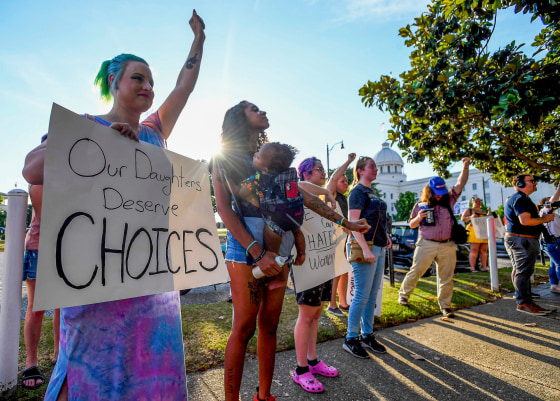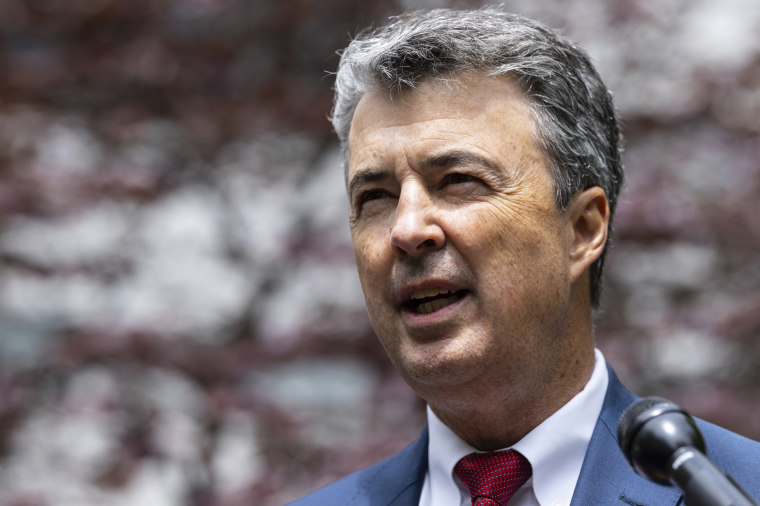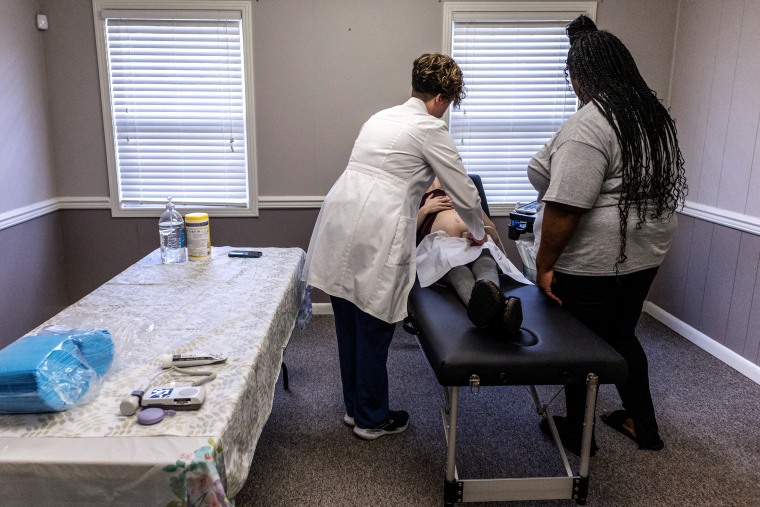
The lawsuit tests the limits of Alabama’s strict abortion ban and the power of its outspoken attorney general.

Alabama has one of the most restrictive abortion bans in the country. The state's attorney general has said people who help residents get out-of-state abortions could be criminally charged. Mickey Welsh / Advertiser / The Montgomery Advertiser via USA TODAY Network
Aug. 1, 2024, 9:28 PM UTCA federal court judge in Alabama will soon answer a crucial question: In a state where abortion is illegal, can health care providers and advocates be punished for helping patients seek the procedure elsewhere?
In 2022, just weeks after the U.S. Supreme Court overturned Roe v. Wade and the state’s abortion ban kicked in, Alabama Attorney General Steve Marshall, a Republican, said on a radio show that groups helping to fund out-of-state abortions could face felony charges.
His comments rattled health care providers, who might advise a pregnant woman seeking an abortion to travel out of state, and abortion funds that help arrange and fund such travel. That advice and support are key, abortion-rights supporters say, because several states across the South have either restricted or banned abortion, resulting in a maze of conflicting laws for patients to navigate.
So the providers and advocates took Marshall to court, separately suing to block him from making good on the threat of prosecution.
“No Alabama law authorizes such prosecutions. Nor could it. That would be a blatant extraterritorial overreach of state power,” the providers’ lawsuit states, arguing that Marshall’s vow violates the First Amendment, the right to travel and other constitutional protections.
Marshall’s office did not respond to a request for comment or address concerns that his reading of the law could make relatives of women seeking abortions vulnerable to prosecution. In a filing in August asking the court to dismiss the now consolidated case, his office argued, “An elective abortion performed in Alabama would be a criminal offense; thus, a conspiracy formed in the State to have that same act performed outside the State is illegal.”

The plaintiffs, who include the Yellowhammer Fund, an abortion fund, and West Alabama Women’s Center, now known as WAWC Health Care, along with other health care providers, have some reason for optimism. In May, U.S. District Judge Myron Thompson of the Middle District of Alabama, who will rule on the case, declined the state’s request to dismiss it.
“Alabama can no more restrict people from going to, say, California to engage in what is lawful there than California can restrict people from coming to Alabama to do what is lawful here,” he wrote at the time.
If the plaintiffs win, providers and advocates would be able to freely provide information about out-of-state abortion options, as well as financial support, without risk of prosecution. It could also represent a rare victory for abortion rights in a state with one of the strictest bans in the country, with an exception only for serious health risks to the patient.
Jamila Johnson, an attorney with The Lawyering Project, who is representing the Yellowhammer Fund, said there are broader consequences if the state is allowed to use anti-conspiracy laws against those who help with travel.
“Nobody wants to put their doctor at risk,” she said. “Nobody wants to put their mother, or their loved ones at risk, or the community groups that they relied on in their neighborhood. So, you can see this creates a tremendous amount of silence and people who aren’t going to ask for the help that they need.”
Alabama is not the only state where people who help abortion-seekers travel out of state have been called into question. Last year, Idaho banned people from helping minors cross state lines in pursuit of abortions without parental consent. In Texas, an anti-abortion attorney has argued that a “bounty hunter law” allowing private citizens to bring civil suits against people who help residents obtain abortions after six weeks could also apply to abortions performed outside the state. Legal experts dispute that interpretation of the law.
Although Marshall has not brought any charges, abortion-rights advocates say his remarks have had a chilling effect on abortion funds and health care providers.
The Yellowhammer Fund paused its assistance because of Marshall’s remarks and now focuses on helping people access contraception, mutual aid and other care. When people call seeking abortions, it now tells them it cannot provide them funds for abortion or refer them elsewhere.
Kelsea McLain, the organization’s deputy director, told NBC News that’s a steep decline from the past when she could come in on a Monday and already have 20 callers in the queue. She estimated that previously, the group helped between 100-200 people per month.
For her, turning callers away is personal. More than a decade ago, an abortion fund supported her through ending a pregnancy.
“I think such a crucial part of the abortion funding process is hearing from someone that they support you and they want to help you and that your choice is valid, and you deserve love and support through that choice,” McLain said.
Advocates say the threats of prosecution compound existing hurdles to reproductive health in Alabama, one of the country’s poorest states, where maternal mortality rates exceed the already grim national average. At least three labor and delivery units in the state have closed since the ban kicked in, and another is set to close this month.

WAWC Healthcare, another plaintiff in the case, which is being represented by the American Civil Liberties Union, used to offer abortions, but has remained open to provide prenatal care and other reproductive health care, such as wellness exams.
Robin Marty, the organization's executive director, says the clinic’s doctor sees pregnant patients who are often at high risk of complications. But discussions about abortion as an option are off the table. Although the state’s abortion ban has a health exception, she said, it’s unclear what falls into that category. There’s a fear that even in a medical setting, such interactions could open providers up to prosecution.
She hasn’t yet let herself picture what the future looks like if the ruling goes in their favor. She’s not willing to let her guard down.
“We were an abortion clinic; we are no longer an abortion clinic,” Marty said. “But having been an abortion clinic in Alabama, we understand that there are no certainties,” she said, adding that the state will continue to find ways to target hers and other groups. “It’s one of the reasons why this lawsuit was so necessary.”
Bracey Harris is a national reporter for NBC News, based in Jackson, Mississippi.